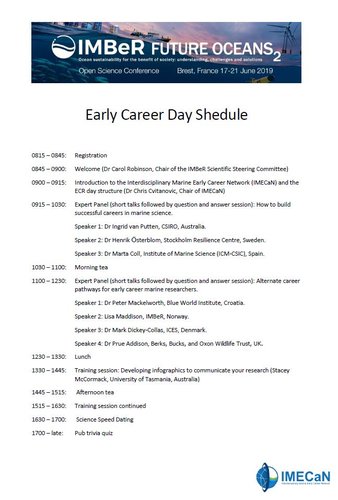Early career researcher day (Sunday 16 June)
Conveners: Prue Addison, Stephanie Brodie, Chris Cvitanovic, André Frainer, Maria Grazia Pennino, Priscila Lopes, Jon Lopez, Sabine Mathesius, Kelly Ortega-Cisneros, Natasa Vaidianu
IMBeR will be launching our new Interdisciplinary Marine Early Career Network (IMECaN) at the Open Science Conference in 2019. The overarching goal of IMECaN is to bring together early career marine researchers from across the globe working on topics related to the IMBeR Grand Challenges, and in doing so provide:
- A networking platform for early career marine researchers to develop collaborations;
- Training and development opportunities for early career marine researchers in areas not traditionally provided through formal education and training programmes (e.g. policy engagement, science communication, etc.); and
- Leadership opportunities for early career marine researchers, particularly those from developing nations.
IMECaN activities will be overseen by a committee of IMBeR Early Career Scientists and will be open to all marine science students (Masters and PhDs) as well as early career researchers (less than seven years post-PhD, and less than six years since their first research appointment). For more information about IMECaN please refer to our IMECaN page.
To celebrate the launch of IMECaN there will be a dedicated Early Career Researcher workshop at the Open Science Conference, consisting of:
- Talks from selected members of the IMBeR Scientific Steering Committee, who will reflect on their careers in marine science and the things that they wish they had known as early career researchers;
- Talks on alternative career pathways for marine scientists.
- A workshop on how to create great figures and diagrams for your publications and other forms of science communication
- A range of networking activities at Le Vauban over drinks and snacks!
Inforgraphics speaker
 Stacey McCormack
Stacey McCormack
Stacey McCormack is an entrepreneur in science communication, based in Tasmania, Australia. She is the founder of McCork Studios, a graphic design company that works to help researchers and organisations visualise and communicate their knowledge. She recently completed her PhD in ecosystem modelling and Antarctic food web ecology at the University of Tasmania, where she also discovered her passion for scientific graphic design. Over the past two years, Stacey has created figures for articles in numerous journals, including Nature and PLOS One and has worked with teams of researchers across a broad range of disciplines to develop infographics that have appeared on Twitter, numerous blogs and media websites. In addition to designing creative science communication output, Stacey is passionate about equipping others with the skills to share their science in interesting, understandable and appealing formats. At Future Oceans2, she will convene a visual graphics workshop during the Early Career Day (Sunday 16 June) to teach students and early career researchers ‘the basics’ of graphic design, thereby helping them to improve their own science communication and ultimately, increase the visibility of their research.

